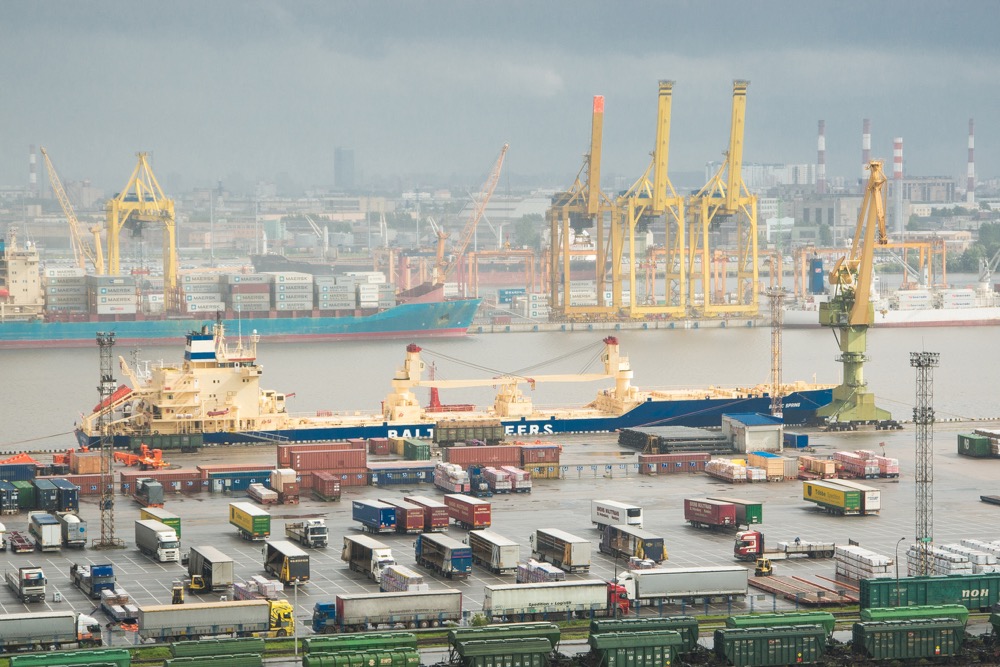Ocean carriers expect sanctions against Russia to tighten in the coming days and are offering no guarantees that cargo already on the water will make it to the country’s main gateway port of St. Petersburg, today reported the JOC.COM news platform. That is likely to leave thousands of containers on board vessels and clogging Europe’s already congested marine terminals.
With no direct container shipping services from Europe going into Russia at the moment, the containers currently on the water — estimated by Vespucci Maritime CEO Lars Jensen to be about 10,000 TEU — must be transshipped in Northern European hubs and then loaded on feeder ships.
However, customs authorities in Holland, several hub ports, and feeder operators are refusing to handle Russia-bound boxes, according to Jeremy Nixon, CEO of Ocean Network Express (ONE).
“In the case of the Baltic Russian ports, we hub through Rotterdam, Bremerhaven, and Hamburg, and those ports are placing restrictions on the shipping of Russian cargo,” Mr. Nixon told the TPM22 Conference in Long Beach this week.
“We made the decision to stop accepting Russian cargo coming into Europe through those hub ports,” he added. “We were told by the feeder operators and by the ports that they were not going to accept cargo in transit to Russia.”
ONE this week was joined by Maersk, Mediterranean Shipping Co., CMA CGM, and Hapag-Lloyd in suspending the acceptance of new bookings for cargo to and from Russia as sanctions were imposed on Moscow following the invasion of Ukraine.
“We expect sanctions to get tougher over the next week, the trading conditions will get tougher, and the Asian exporters will not be able to move the products, and the buyers in Russia will not be able to land it,” Mr. Nixon told TPM22.
Maersk said in an advisory Wednesday it was seeing significant delays in European hubs for Russia-bound cargo, which was adding to the port and inland congestion that has plagued the region for much of the last year.
The carrier has subsequently pushed its moratorium on handling Russian cargo back up its container supply chain.
“To further cope with the congested network in European ports, we are temporarily holding the release of equipment for confirmed booking, as well as stopping all stuffed containers destined to Russia at first load port or transshipment port,” Maersk said.
To minimize the disruption, several carriers have introduced “relief packages” for shippers of cargo to and from Ukraine and Russia, such as free change of destination services with no booking cancellation fees. Maersk has extended its temporary suspension of detention and demurrage charges for imports to and exports from Ukrainian and Russian ports until March 11, and will not be charging storage fees for cargo on its way to Russia and Ukraine that cannot be delivered.
Maritime trade with Russia and Russian businesses will be difficult in the months — possibly even years — to come, according to Christian Roeloffs, co-founder and CEO of visibility provider Container xChange.
“On Monday, the UK banned all Russian ships from entering its ports, and there has been at least one ship arrest by the European Union,” Mr. Roeloffs said in a statement Wednesday.
And with surface and air routes between Asia and Europe that traverse Russia likely unavailable for commercial cargo movement, those volumes will be forced to travel by ocean, further crimping already tight vessel and equipment capacity, he said.
“On the Asia–Europe trade, we could see more demand for maritime shipments and equipment out of Asia due to modal shift,” Mr. Roeloffs said. “For example, the Asia–Europe rail and road routes through Russia and Belarus are reportedly closed and being used by militaries. Borders with the EU are closed. The closure of air space across Russia and Europe has also reduced air freight capacity.”
That increase in demand for ocean services could result in shortages of empty containers and further congestion at destination ports in Europe. (Dreamstime photo of St. Petersburg)


